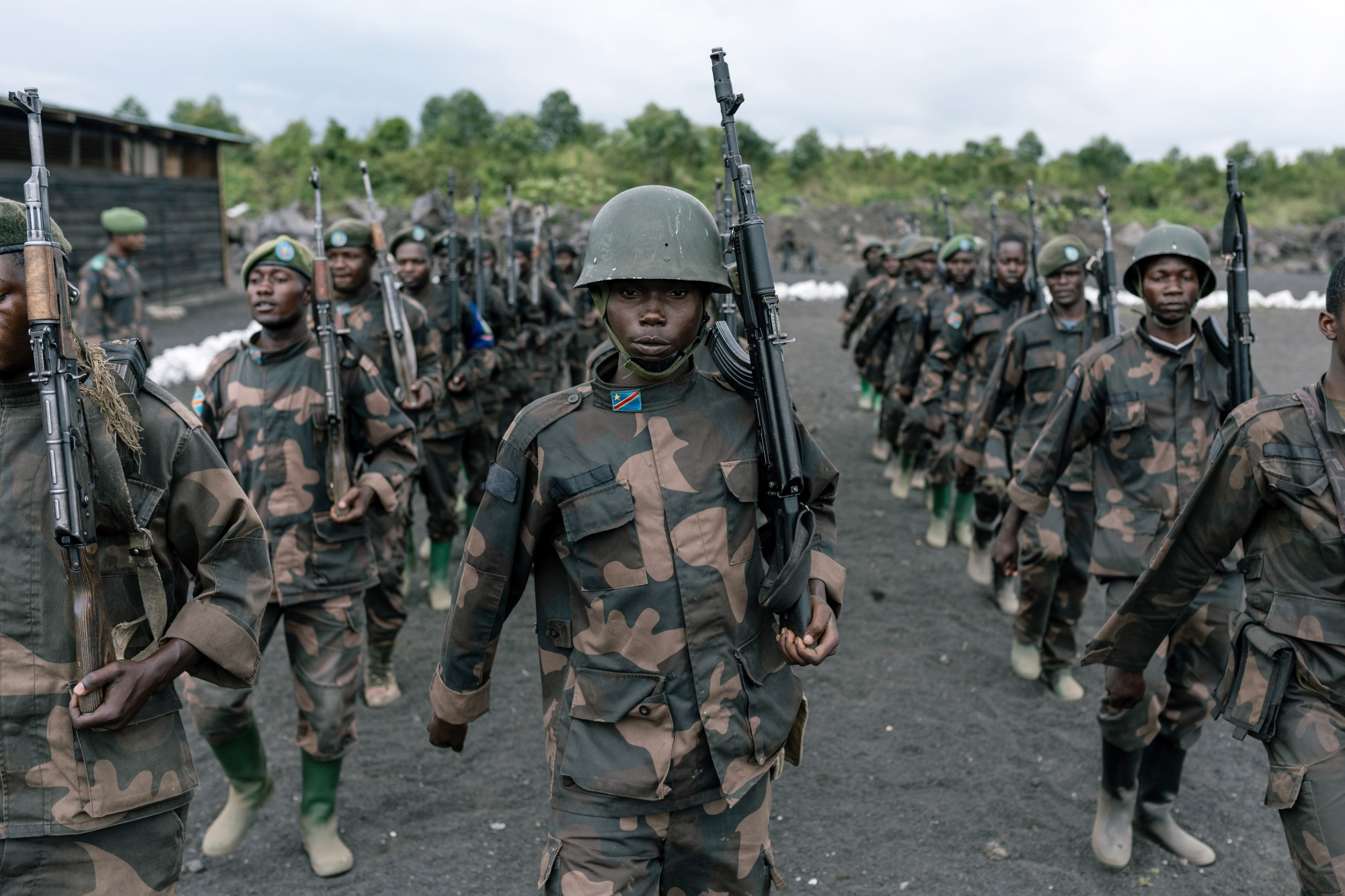A recent UN report accuses Rwanda of aiding M23 rebel group that’s battling Congolese forces in eastern DRC.
As Rwandans go to the polls for presidential and legislative elections, some 9.7 million people are voting in an atmosphere of peace and stability. It is a long way from the devastation the East African country faced after the 1994 genocide against its Tutsi population when President Paul Kagame first became de facto leader.
Thirty years on, Kagame faces no serious challenge to his rule and is expected to be re-elected for a fourth term. Critics accuse the president of repressing the opposition domestically. However, Kagame is also loved by many Rwandans, young and old alike. Many praise the longtime leader for reuniting the country after the genocide and setting it on a path of economic growth.
Yet, as Kagame seeks re-election, tense relations with Rwanda’s bigger neighbour, the Democratic Republic of the Congo (DRC), remain a deepening challenge for both countries and the broader region, say analysts.
Escalating tensions between the two, intensified by a United Nations report released last week, risk snowballing into a wider regional conflict, some fear.
In eastern DRC, M23 rebels, an armed group formed largely of Rwandans, are engaged in a deadly offensive with the Congolese military that has led to a massive humanitarian and displacement crisis and subsequent mediation efforts by regional leaders.
According to the UN expert group report, 3,000 to 4,000 Rwanda Defence Force (RDF) members are fighting alongside the M23 in DRC. A previous UN report accused Kigali of supporting and aiding M23. This time, though, the experts said Rwanda is the “de facto” leader of the group. RDF operations, it added, “extended beyond mere support” but encompassed “direct and decisive involvement”. Uganda, an ally of Kigali, is also accused of aiding M23’s movements.
Valtino Omolo, a researcher at the Institute for Strategic Studies (ISS), told Al Jazeera the UN report “[could] possibly lead to increased international actions against Rwanda, such as economic and diplomatic sanctions”.
All parties, including M23, RDF and the Congolese forces tortured and executed civilians seen as supporting their opponents, the 293-page report detailed. Gold from the mineral-rich eastern DRC was also smuggled across into Rwanda and Uganda, it alleged.
Rwanda’s government did not respond to Al Jazeera’s request for comment on the allegations, but has repeatedly, in the past, rejected such allegations. Government spokesperson Yolanda Makolo did not outrightly deny RDF’s presence in the DRC while speaking to reporters last week, but pointed to Kinshasa’s support for an anti-Kagame Rwandan rebel group, the Democratic Forces for the Liberation of Rwanda (FDLR).
“The DRC has all the power to de-escalate the situation if they want to, but until then, Rwanda will continue to defend itself,” Makolo said.
Nearly two million people have been displaced and hundreds killed as clashes between the M23 and Congolese troops continue. DRC Foreign Affairs Minister Therese Kayikwamba Wagner has accused Rwanda of heightening the “massive displacement crisis”.
“The question we should be asking ourselves is why Rwanda is not being sanctioned for violation of our territory,” Wagner told Al Jazeera.
A long, intertwined history
The three-decade-long conflict in eastern DRC is closely linked with the Rwandan genocide, during which members of the Hutu ethnic group killed some 800,000-1,000,000 mainly Tutsis over 100 days in 1994.
Rwanda, with Uganda, invaded the DRC in 1996 and then again in 1998, sparking the two Congo wars. Both claimed the pursuit of rebels hiding in eastern DRC. Kigali was after the Hutu militias that fled Kagame’s Tutsi forces after the genocide and amassed in refugee camps in the DRC to launch incursions. However, Kigali is also accused of using the wars as a pretext to loot the DRC’s plentiful minerals.
Instability in eastern DRC led to the emergence of a hoard of armed groups battling to control the mineral-rich region. Alongside the M23, between 120 to 140 rebel groups are active in the country. A 15,000-member-strong UN peacekeeping mission, MONUSCO – deployed since 1999, did not deter the groups. This February, the peacekeepers began their withdrawal after a frustrated President Felix Tshisekedi said they had failed to protect Congolese.
M23 is the biggest threat Kinshasa currently faces. When it first emerged with ferocious force in 2012, the group seized swaths of territory in the east, including the key city of Goma, capital of North Kivu province. It claims to be fighting for the rights of minority Congolese Tutsis, whose ancestors arrived from Rwanda generations ago. Members say they face discrimination in DRC for their ethnic links to Rwanda’s Tutsi community. Local politicians, in the past, questioned their citizenship, for example. Experts say that treatment has pushed many to join groups like M23, even as the rebels’ actions intensify a negative perception of Tutsis.
M23’s first rebellion was crushed. But in late 2021, it re-emerged, accusing Kinshasa of reneging on promises to integrate fighters into the army. It now controls several towns and last week seized Kanyabayonga, a four-hour drive from Goma. The UN said the group’s advances, aided by the RDF, have benefitted from advanced weaponry and that it has grounded all air assets of the Congolese military.
Victoire Inagbire, a high-profile Rwandan opposition politician, said the UN’s allegations against Rwanda were “frightening” and raised questions for Rwandans.
“Why and under what mandate our soldiers would be sent to fight in DRC? If this is true … it reinforces the undemocratic process in Rwanda governance that I have always denounced,” Inagbire, who is one of several intending presidential candidates barred from the Rwandan elections, told Al Jazeera.
Rwandan officials, including Kagame, often point to Kinshasa’s support for the FDLR, the Hutu rebel group fighting alongside Congolese forces. FDLR and Nyatura, a group of Hutu militias, are accused of persecuting Congolese Tutsis.
Rwandan officials have also said Kinshasa does not address general discrimination against Tutsis, including hate speech. Tshisekedi said in a speech to the UN last year that his government “stands firm against any individual or group of individuals who would engage in such a speech and reiterates its request to every person, organisation or external partner to denounce it”.
The United States has tried to intervene, although that has put Rwanda at odds with its one-time ally. When Washington, last August, sanctioned a Rwandan general believed to be active in the DRC, Kagame promoted him in defiance, some say. A Congolese official and an FDLR leader were also among those sanctioned.
Meanwhile, the regional Eastern African Community (EAC) trade bloc has struggled to mediate. Peace talks it brokered have failed. A Kenya-led EAC intervention force Tshisekedi requested in 2022 lasted only a year before being asked not to return because it refused to go on the offensive.
It has been replaced by a new 2,900-member-strong force from the Southern African Development Community (SADC). This mission’s troops comprise peacekeepers from South Africa, Tanzania and Malawi.
Hopes for peace?
In Rwanda, the trouble across the border is not on the list of key concerns for voters this week. Most pressing for many is the rising cost of living as food inflation pummels the country.
But the effects of the violence are not invisible. Amid the conflict next door, thousands of Congolese have been forced to flee their homes into Rwandan towns, adding to a refugee burden on the small country.
“War generates losses in human life and also affects economic development, especially cross-border trading,” said Inagbire, the opposition politician.
In the DRC’s Goma, displaced people’s camps are swelling, even as diseases like measles and cholera sweep through. Aid groups have ceased sending food and other supplies to M23-controlled towns like Kanyabayonga because of security risks posed by the heavy fighting.
A two-week humanitarian truce from July 4 to July 19 was brokered by the US to allow humanitarian access to vulnerable people and allow some displaced to return; however, attacks have continued.
How the two countries will address their complex and deep issues remains unclear, despite calls from the UN and the US to de-escalate. Angola, a growing US partner, has sought to get Tshisekedi and Kagame to the negotiating table, but that has not happened yet. The African Union (AU) in 2022 appointed President Joao Lourenco to mediate between the two.
Last year, when presidential campaigns were under way in the DRC’s election, combating Rwanda was a hot-button topic. In his re-election campaigns, Tshisekedi verbally attacked Kagame, calling him ‘Adolf Hitler’ and threatening to take the war to Kigali’s doorstep.
In his responses, Kagame has been more measured, but he said Rwanda was “ready for anything”.
Addressing historical ethnic-linked grievances and bolstering non-military solutions in the troubled eastern DRC will be critical, alongside foreign missions, said Omolo of ISS. The AU launched a disarmament and reintegration programme for ex-fighters in 2011. The bloc last year said it would continue to back locally-led peace solutions.
Regional leaders need to step up too, Omolo said.
“The role of dialogue and diplomatic efforts to de-escalate the situation should be highly prioritised, especially by the EAC. Both countries have more to lose than there is to gain in pursuing armed conflict. Regional stability remains paramount,” he added. – AL JAZEERA
By Shola Lawal








